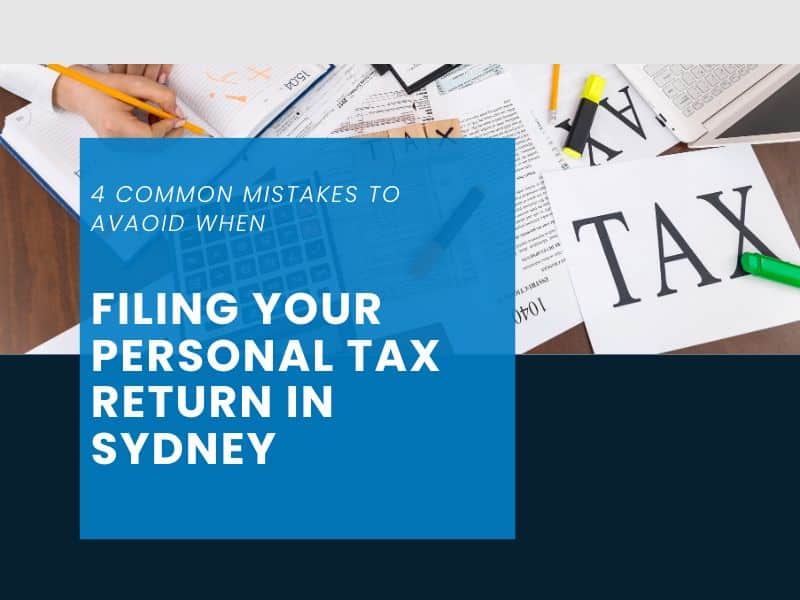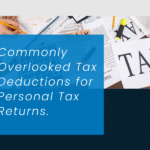4 Common Mistakes to Avoid When Filing Your Personal Tax Return in Sydney
Tax season can be an anxiety-inducing ordeal for Australians unfamiliar with tax laws and regulations, particularly those without enough knowledge to file their personal returns on time. Filing personal returns should not be avoided however as its requirements cannot be avoided. As a resident of Sydney, it is your duty to comply with all tax requirements to avoid penalties and legal issues. Unfortunately, many people make mistakes when filing their personal taxes returns, leading them into more financial stress and stress relief than necessary. This article will outline some of the mistakes to watch out for when filing your personal tax return in Sydney. Whether this is your first or 10th attempt at filing, these tips can help ease you through the tax process with confidence and ease. So let’s go ahead and discover ways to avoid these common tax mistakes!
Understanding personal tax returns
Before discussing the common errors people make when filing their personal tax returns, it’s essential that we first understand what a personal tax return is and its function. A personal tax return is an annual form filed with the Australian Taxation Office (ATO) reporting your income and claiming any deductions or credits due. With this information at their fingertips, ATO uses this information to calculate either how much in tax you owe or whether or not a refund may be owed back to you.
To file your personal tax return, it is necessary to collect all your income and expense records for the fiscal year in question. This includes details on any income such as wages and salaries, dividends, interest payments, rental income or any other source that was received throughout the year. Furthermore, documentation will need to be provided for any deductions you claim such as work-related expenses, charitable donations or investment costs that you claim against your income tax return.
Common mistakes made when filing personal tax returns
Now that we have an increased understanding of what personal tax returns entail, let’s review some of the more frequent errors people make when filing their returns.
1. Failing to Declare All Income
One of the primary mistakes people make when filing their personal tax returns is failing to declare all their income. This could happen for various reasons such as forgetting a side job or investment income or not understanding which items need to be reported.
The ATO employs sophisticated data-matching systems that enable them to cross-check what income has been declared on your tax return with information provided from other sources, such as your employer or financial institutions. If they discover any failure on your part to declare income, penalties and interest charges could be assessed and even prosecution pursued.
2. Claiming Deductions without Documents
One common misstep people often make when filing tax deduction claims is failing to submit sufficient documentation of expenses incurred and related directly to earning their income, such as receipts, invoices or bank statements. In order to claim deductions correctly and successfully you must be able to present proof that these expenditures occurred; evidence such as receipts can include receipts invoices bank statements etc.
If you attempt to claim a deduction without proper documentation, the ATO could disallow it and assess penalties and interest charges; they may even conduct an audit or investigation to ascertain if you intentionally misrepresented your tax affairs.
3. Filing late or missing the deadline
Filing late or missing the deadline altogether for your personal tax return could incur penalties and interest charges, with 31 October being the typical deadline; if using an agent however, lodgements could take place after this date if required.
If your tax return is late, the ATO may impose a failure-to-lodge penalty of between $222 and $1,110 depending on its length of delay. They also charge interest on any debt which quickly adds up over time.
4. Not seeking professional advice
One of the biggest mistakes people make when filing personal tax returns is failing to seek professional advice. Tax regulations can be complex and difficult to navigate; without professional guidance it can be hard to know whether you are claiming all applicable deductions and reporting your income correctly.
By working with an experienced tax agent or accountant, you can ensure your tax return is complete and compliant with all relevant laws and regulations. They will also offer advice on how to minimize your tax liabilities in the future and plan ahead for potential surprises.
Tips for avoiding mistakes when filing personal tax returns
Now that we’ve covered some of the common mistakes people make when filing their personal tax returns, let’s go over some strategies for avoiding these errors.
Accurate Records One of the key elements to avoid errors when filing your personal tax return is keeping accurate and up-to-date records of income and expenses, along with supporting documentation to back any deductions you claim. This means ensuring all income and expense records are easily accessible while also having adequate documentation supporting deduction claims.
Understanding What Should Be Reported
One key to avoiding mistakes on your tax return is understanding exactly what needs to be reported, including all sources of income and deductions you are eligible for claiming as well as expenses you’d like deducted.
Using a tax agent or accountant
Engaging the services of a professional tax agent or accountant is also vital when filing your personal tax return, helping to prevent mistakes and ensure accuracy with regard to deductions and liability calculations as well as meeting all regulations and laws pertaining to filing taxes accurately and compliantly.
Filing on Time
Filing your personal tax return by the deadline is vital if you want to avoid penalties and interest charges, so if necessary seek an extension or work with a tax agent or accountant as soon as possible to file.
The consequences of making mistakes on your tax return
Failing to file your personal tax return accurately and on time can have serious repercussions, including penalties, interest charges and even prosecution. The ATO has wide powers of investigation and audit for those suspected of underreporting income or overstating deductions; should this happen they could impose heavy fines and charges.
Conclusion
Filing your personal tax return can be a complicated and frustrating experience. By understanding common errors that people make when filing their return and taking steps to correct them, you can ensure yours is accurate and compliant with all relevant laws and regulations. Make sure you keep accurate records, understand what needs to be reported, seek professional advice when necessary and file on time in order to avoid penalties and interest charges – by following these tips you can navigate your personal tax journey more smoothly while reducing stress levels and financial setbacks.









